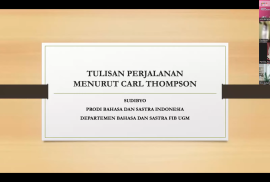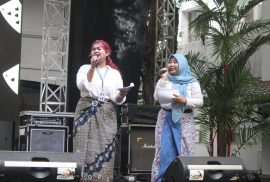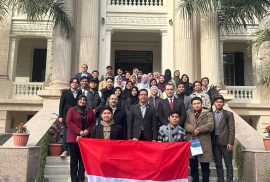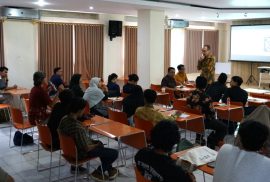On Saturday, March 23, 2024, the Association of Indonesian Literature Scholars Commissariat Jember (HISKI Jember) in collaboration with the Faculty of Teacher Training and Education of Muhammadiyah Jember University (FKIP Unmuh Jember), the Department of Indonesian Literature, Faculty of Cultural Sciences, University of Jember (FIB UNEJ), Semiotics Journal, Cultural Context Literature Research Group (PERSADA), Oral Tradition and Local Wisdom Research Group (TERKELOK), Teen and Children’s Literature Research Group (TCLRG), and Center for English Literature and Culture (CELC), held a National Webinar entitled, NGONTRAS #32 (32nd Metasastra National Chat), This webinar invited the Head of the Department of Language and Literature, Faculty of Cultural Sciences UGM, Dr. Sudibyo, M.Hum, as a guest speaker who discussed the theme of travel literature with a presentation entitled, “Travel Writing: According to Carl Thompson”. This activity took place from 10.00 – 12.00 WIB with a series of opening, presentation by Dr. Sudibyo, M.Hum. and Dr. Rahayu Puji Haryanti, M.Hum., question and answer discussion, and closing with a symbolic certificate award.
The presentation by Dr. Sudibyo, M.Hum., began with an explanation of the theme of travel literature according to Carl Thompson, who stated that travel literature is the result of an encounter and negotiations over the differences or similarities that accompany it. All travel writing has two intertwined aspects, a report on the wider world and a record of an unknown person or place, revealing the writer’s self along with values, inclinations, assumptions, and culture in addition to the culture addressed by the travel story. The function of travel stories is to inform the outside world, reveal the self, and represent the other.
In addition, a number of literary works are presented as examples of discussion, each of which is explained in terms of the three functions previously mentioned. The literary works are novels that are dissected for exposure to identify and review parts of the novel. From the series of national webinar activities that have been held, this activity is also part of the Community Service carried out by Dr. Sudibyo, M.Hum., in the form of education and creating a national level literature and literature discussion space.






